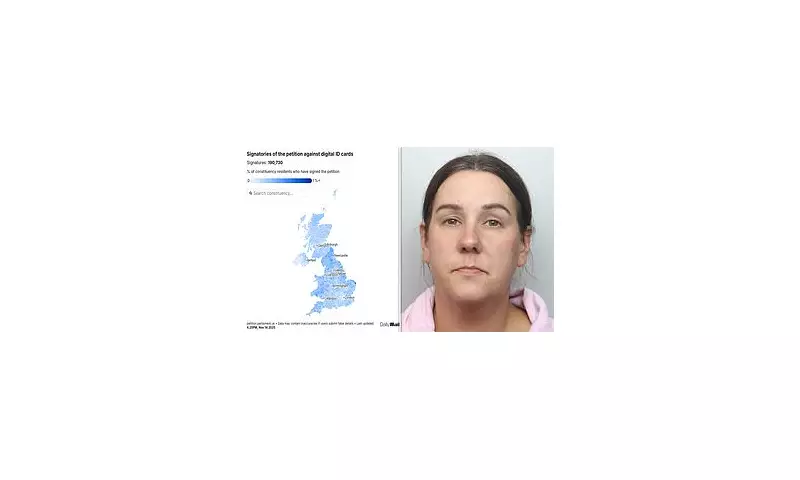
Nationwide Backlash Against Social Media Prosecutions
Areas across the United Kingdom demonstrating strongest opposition to imprisoning individuals for social media content have been identified in new mapping data. The revelation comes as nearly 200,000 citizens signed a petition demanding an end to custodial sentences for "offensive" online posts, reflecting growing public anxiety about threats to free expression.
The petition, initiated by former Reform MP Rupert Lowe, has secured sufficient support to trigger a parliamentary debate scheduled for Monday, November 17. Lowe expressed "serious public concern" about the proportionality of sentencing in cases involving online opinions, warning that current practices establish a dangerous precedent.
Constituency Support and Political Backing
The businessman-turned-politician, who has developed ties with X owner Elon Musk, argued that imprisoning individuals for social media content raises fundamental questions about freedom of expression and the appropriate use of limited prison resources. His petition advocates for alternative sanctions including fines or community service instead of incarceration.
Statistical analysis reveals that Lowe's own constituency, Great Yarmouth in Norfolk, demonstrated the highest rate of support nationwide. From a population of 100,529 residents, 1,074 people endorsed the petition - representing a significant 1.07% backing rate.
The Lucy Connolly Case: A National Flashpoint
The debate surrounding social media prosecutions gained prominence following the case of Lucy Connolly, wife of Conservative councillor Ray Connolly, who received a 31-month prison sentence for stirring up racial hatred after the Southport attack. Her sentence stands as the longest custodial term ever imposed for a single social media post in the UK.
Connolly's controversial tweet, which remained visible for three hours and accumulated 310,000 views, called for "mass deportation now" and included inflammatory language about migrant accommodation. Despite being a first-time offender considered low flight risk, she was denied bail and ultimately served 377 nights in prison - equivalent to more than a week for each of the 51 words in her original post.
In May, three Court of Appeal judges at the Royal Courts of Justice rejected her sentence appeal. Supporters have characterised Connolly as a political prisoner who received excessively harsh punishment for an isolated offence that caused no physical harm.
Political Divisions and International Attention
The case has exposed political divisions, with Prime Minister Sir Keir Starmer telling Parliament he would "always support" court decisions in such matters. Conversely, Tory leader Kemi Badenoch argued Connolly's punishment exceeded sentences given for physical violence against police officers or actual rioting.
Badenoch contrasted Connolly's outcome with that of former Labour councillor Ricky Jones, who was acquitted by a jury that viewed his violent remarks as "disgusting" but not criminal incitement. The discrepancy has fueled accusations of inconsistent enforcement.
International observers have taken note, with US State Department officials confirming they are monitoring developments due to concerns about free speech implications. American political commentator Charlie Kirk, before his death in September, learned of Connolly's situation during a UK visit and pledged to involve US diplomatic channels.
Public Priorities and Policing Resources
Public frustration has intensified as official statistics reveal that 90% of all crimes went unsolved in 2023, compared to 75% in 2015. Many Britons report receiving only crime reference numbers for thefts while observing vigorous prosecution of online speech offences.
Policy Exchange think tank polling indicates only 7% of adults believe online hate crimes should be police top priority, with overwhelming preference given to investigating violence, burglary, robbery and drug offences. However, social media posts from identifiable accounts present easier investigative targets, resulting in approximately two-thirds of such cases having named suspects.
Jemimah Steinfeld of Index on Censorship acknowledged the challenge: "Lines between offensive expression and genuine incitement can be difficult to draw. If we want to protect pluralistic speech, the threshold for criminal speech must remain very high."
Government Response and Future Implications
The government has responded to the petition with a statement praising freedom of expression as a "cornerstone of our democratic society" while defending current sentencing frameworks. A spokesman emphasised that courts already possess multiple sentencing options beyond imprisonment and stated no plans exist to review penalties for these offences.
Since her August release, Lucy Connolly has emerged as a political figure, receiving enthusiastic reception at Reform UK's September conference in Birmingham. Party leader Nigel Farage described her as an important symbol in the fight to restore free speech, while Connolly herself claimed prison authorities censored photographs of her daughter during incarceration.
The parliamentary debate scheduled for November 17 promises to address these contentious issues as the nation grapples with balancing free expression against the regulation of online discourse in the digital age.





